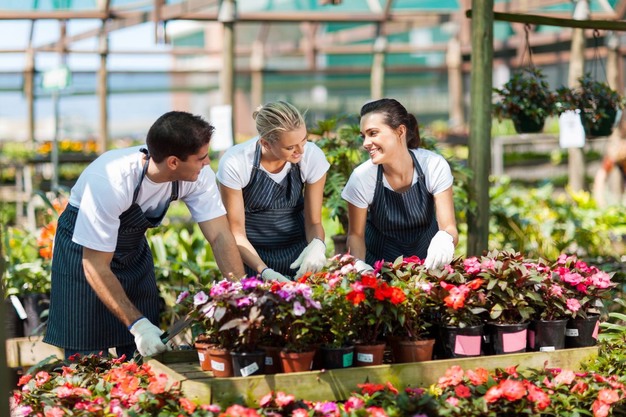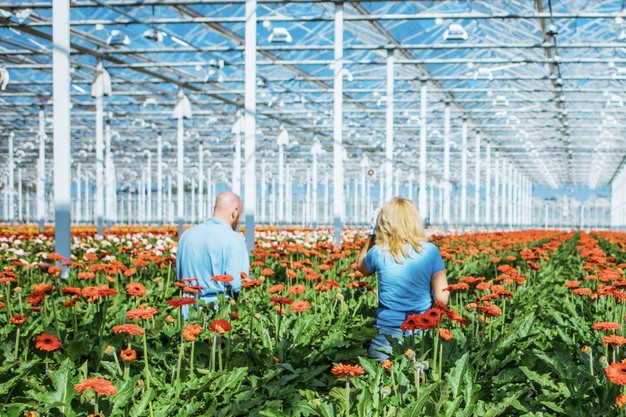For over six decades, the American Floral Endowment (AFE) has represented the entire floral community, providing and sharing free resources to everyone, thanks to the generosity of donors. As the industry's leading charitable organization, AFE receives and collects donations to invest them, generating funding that advances floriculture through research, education, and special programming. Recently, the Endowment began a new program that aims to further that growth, this time focusing on helping industry members approach and become more actionable with sustainability.
Sustainabloom is a research-driven program created to provide in-depth guides and resources about sustainability developed by top researchers in the field. The information is housed efficiently within an easy-to-navigate website. The goal, according to Debi Chedester, CAE, AAF, and Executive Director of AFE, is to lead the charge in floriculture sustainability and continue strengthening the industry by sharing ways to do more.
"Backed by expertise in the field of floriculture research, AFE felt that taking the lead to develop Sustainabloom was the right fit with our mission of providing funding for the advancement of floral and our connections to expert researchers as well as forward-thinking industry members who support the organization's mission. It just made sense," she said. "We are thankful to our industry sponsors who stepped up from the very beginning to fund the initiative and get the program started."
Chedester said conversations with those within the industry revealed that many were overwhelmed by sustainability and didn't know where to start. The program takes a comprehensive approach to sustainability overall and breaks it down, piece by piece, for industry members to implement in their respective operations.
"We recognize that sustainability is something that is never finished, so the research will continue, and the site will evolve as sustainability evolves," she said.
In addition to the valuable information already accessible on the website, a webinar will be held this summer to showcase the site and review best practices in using the resources.

When AFE started its sustainability initiative in 2021, the organization enlisted the help of top researchers in the field. One of the research team members, Dr. Melinda Knuth, Assistant Professor of horticultural sciences at North Carolina State University, said she welcomed the opportunity to develop ways to provide sustainability information, especially to small- and medium-sized floriculture firms across the globe.
"I have had the chance to participate in projects with AFE before, but I was particularly excited about it because this is a core reason that academic institutions exist for agriculture," she said. "It is to serve the industry, so with this program, our whole goal is for the growers, retailers, and every aspect of the industry to be able to utilize the resources, not just to be given findings. The program is structured to show them how they can directly implement the information and how it can be helpful to them."
Amanda Solliday, a Ph.D. horticulture science student at North Carolina State University, became part of Sustainabloom's research team following her involvement with other projects related to climate change. With a personal and professional interest in environmental issues and a background in plant science, she said the initiative was a perfect blend of her interests and a natural fit for her.
"I feel like there is so much information out there about sustainability," she said. "A big part of it is just putting it into a format that is understandable. Pulling all the threads together into something that makes sense in a specific context. I was attracted to being a part of that."
The research team spent months gathering more than 1,000 pieces of information from academic journals, various reports, conversations with industry partners, and other materials. From there, the information was synthesized and distilled from high-level academic and scientific jargon to easy-to-understand language. The research team could then take the simplified sustainability information and sort it into a series of industry guide categories. Those categories include:
- Circular Economy and Engagement
- Composting
- Consumer Demands and Preferences
- H2A/H2B Work Visa
- Integrated Pest Management
- Living Wage
- Nutrient Management
- Plastics
- Substrates
- Water Conservation
- Carbon Accounting/Footprint
- Energy Efficiency
- Lighting
Each guide contains topical information, including clear definitions, tips, financial benefits, how-tos, regulation information, and best practices related to the category, as well as links to additional resources.
Ongoing Mission
Dr. Knuth said the initial goals of the Sustainabloom program were to take a "40,000-foot look" at what is going on with sustainability to gain perspective on what information was available and strategize the best course of action.
"It has evolved over time. It has gone from little goals like sharing information about, for instance, certifications and governmental grants, and became more comprehensive," she said. "However, the core vision has always remained the same – to share the information of what's out there and share it as simplistically as possible."
The researchers noted that sustainability is an ongoing process that is changing all the time. To that end, Solliday noted, research and information-sharing must be a constant forge ahead to keep up.

"In some ways, what we are learning and producing today in the floriculture industry might look different in two years," she said. "But that doesn't negate the importance of what we are doing right now. It strengthens it. It's so important to keep on top of all the information and move with it. And it keeps things manageable for industry members as things change around us."
Solliday said the next phase of the Sustainabloom program will begin in the summer of 2024, with the team gathering more data in "hot topic" areas like plastics use, which she said is a category where available information is lacking in the floriculture industry.
Other plans include writing sustainability plans with companies and learning from their experience along the way so that those plans can be shared with and catered to the needs of other companies.
The research team is also conducting a survey to gather additional information from members of the floriculture industry throughout the country regarding their sustainability beliefs and practices. The information will be used to refine Sustainabloom's existing guides and resources and identify additional areas of interest.
Finding Unity in Floriculture
Solliday and Dr. Knuth said one of the most rewarding parts of being involved in the program so far has been the positive interaction with industry leaders who have been eager to share information regarding sustainability and how that relates to the floriculture industry. They have also been impressed with the number of industry members who are sharing their stories about what they are doing to practice sustainability more at their businesses.
"When we look at environmental issues, they are problems that we all created together. It is going to take all of us together to fix them," Solliday said. "We could be doing our research in a vacuum, and no one would do anything with it. Having these early conversations with people who are using the information we are providing along the way makes our work more meaningful. Sustainabloom allows that to happen."
